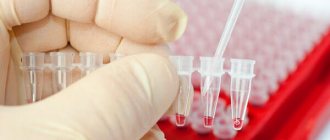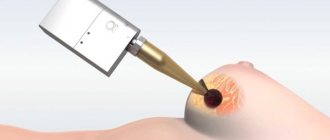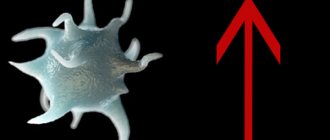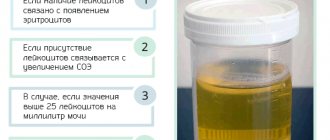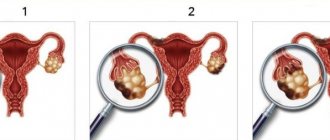What is the SCC tumor marker and for what reasons does its concentration change?
The SCC tumor marker is a tumor-associated antigen of squamous cell carcinomas, which has different locations in the body.
This protein substance was first discovered in 1977 and was found mainly in the epithelium of the cervix. But it is also produced on the walls of the neck and head. In the literature it is known under the following names: Squamous cell carcinoma antigen (SCCA), Tumor Associated Antigen4 (TA-4), SCC-AG and SCCA, Squamous cell carcinoma marker and others.
The specificity of the SCC tumor marker is that it consists of two isoforms:
- SCC1 is produced by healthy and pathological cells and can be increased in infectious, viral diseases and tumors.
- SCC2 is produced exclusively by carcinoma cells, and an increase in its level indicates the development of a malignant disease. The higher the concentration, the higher the stage with the risk of metastasis.
This substance is found in some quantities in human saliva and sweat. Therefore, during the examination, it is extremely important to prevent one or the other from entering the blood.
SCC - squamous cell carcinoma antigen!
Ag SCC squamous cell carcinoma antigen
New test in the laboratory.
SCC Ag or simply SCC is a tumor-associated antigen of squamous cell carcinomas of various locations: cervix, head and neck, esophagus, lungs, vulva. It was first isolated from squamous cell carcinoma of the cervix in 1977. According to the literature, the sensitivity of the marker is on average 80% for stages III-IY of cervical cancer and no more than 50% for early stages. It is applicable for monitoring the course of the disease, assessing the effectiveness of treatment, prognosis and preclinical detection of relapses. The SCC concentration reflects the degree of histological differentiation of the tumor, being an important independent prognostic marker, especially in cervical cancer. It must be taken into account that an increased level of SCC is also found in benign skin diseases and during pregnancy for more than 16 weeks, as well as in patients with bronchial asthma and colds and inflammatory diseases of the respiratory system.
Squamous cell carcinoma is a malignant epithelial tumor that can develop in the cervix, mouth, esophagus, head and neck, lungs, anus and skin. Squamous cell carcinoma antigen (Ag SCC) is a glycoprotein from the serine protease inhibitor family. Normally, a small amount of antigen is produced inside the epithelial cells of the skin, cervix, and anal canal and is not released into the extracellular space. In squamous cell carcinoma, there is an increase in antigen secretion by tumor cells, which may play a role in the processes of invasion and metastasis of carcinoma. The half-life of the antigen in blood serum is 2.2 hours.
When determining Ag SCC in the serum of patients with benign and malignant gynecological diseases, it was found that the clinical sensitivity of serum Ag SCC levels for primary cervical cancer increased from 29% at stage 1 to 89% at stage 4. The researchers believe that measuring Ag SCC levels during a follow-up study can detect disease relapse, residual disease after treatment, and determine how effective the prescribed therapy is.
There is a relationship between the concentration of Ag SCC in the blood and the stage of cancer, tumor size, its progression, aggressive growth pattern and the presence of metastases in lymph nodes and other organs. The SCC antigen is detected in 60% of patients with cervical cancer at various stages. For stage I cervical cancer, the sensitivity of this marker is 10%, for stage IV – 80%. After tumor removal, a decrease in Ag SCC levels to normal levels is observed within 96 hours. A persistently elevated level of squamous cell carcinoma antigen (Ag SCC) or an increase in its concentration after surgical removal of the tumor indicates relapse or progression of the disease. In 46-92% of cases, an increase in the antigen level makes it possible to detect tumor relapse several months before the first clinical manifestations of the pathology.
Numerous studies have shown the relationship between the level of SCC antigen, cancer stage and survival of cancer patients, which is important for the choice of treatment tactics, prescription of therapy, radiotherapy, prognosis and assessment of possible disease relapse. However, a normal antigen level does not exclude the possibility of metastases, just as an increased concentration of squamous cell carcinoma antigen in the blood is not an absolute indicator of the presence of a tumor and cannot be the basis for diagnosis. To evaluate the results of this analysis, it is important to compare the test results before and after radical treatment of the tumor.
What is the SCC ?
- For a comprehensive diagnosis of squamous cell carcinoma with assessment of the likely spread of the tumor process and the presence of metastases,
- To monitor patients with squamous cell neoplasms of various locations,
- To predict survival in squamous cell carcinoma,
- To plan treatment for patients with squamous cell carcinoma,
- To evaluate the effectiveness of treatment for squamous cell carcinoma.
When is the study scheduled?
- If epithelial neoplasm of various organs and tissues is suspected,
- When planning a treatment regimen for patients with squamous cell carcinoma and selecting patients for more aggressive treatment strategies,
- Before and after surgical removal of squamous cell neoplasms of various locations,
- During periodic examination of patients in whom squamous cell carcinoma has been removed.
What do the results mean?
Reference values: 0 - 1.5 ng/ml.
Reasons for increased levels of squamous cell carcinoma antigen:
- squamous cell carcinoma (cervix, mouth, esophagus, lung, anus and skin).
A significant increase in the level of squamous cell carcinoma antigen may indicate the likely spread of the tumor process, the presence of metastases in the lymph nodes and other organs.
An increase in the amount of antigen in the blood after treatment for squamous cell carcinoma indicates the ineffectiveness of the therapy and a probable relapse of the disease.
Other diseases accompanied by a slight increase in squamous cell carcinoma antigen levels:
- benign skin pathology (eczema, erythroderma, pemphigus, psoriasis),
- non-tumor lung diseases (tuberculosis, adult respiratory distress syndrome, sarcoidosis, exudative pleurisy);
- chronic renal and liver failure.
What can influence the result?
Considering the normal increased concentration of squamous cell carcinoma antigen in saliva, sweat, and respiratory tract secretions, it is necessary to completely exclude contamination of the sample with these materials.
Important Notes
- Squamous cell carcinoma antigen is used for disease monitoring rather than screening and diagnosis.
- Based on individual results of this analysis, without additional research methods, it is impossible to confirm or exclude the presence of a squamous cell tumor in the body.
- When the concentration of squamous cell carcinoma antigen in the blood increases and there is objective evidence of the presence of a neoplasm, histological confirmation of the diagnosis and exclusion of other benign diseases is necessary.
Also additionally recommended:
- Neuron-specific enolase (NSE)
- Fragments of cytokeratin 19 CYFRA 21-1
- CA 125 II
- Cytological examination of smears (scrapings) from the surface of the cervix (external uterine pharynx) and cervical canal for atypia
A slight increase in the levels of many tumor markers is possible in some benign and inflammatory diseases, as well as physiological conditions, so the detection of an elevated state of one or another tumor marker is not the basis for a diagnosis of cancer, but serves as a reason for further examination.
When to do an analysis and how to prepare for it
The SCC tumor marker, depending on its concentration in the blood, allows one to determine not only the presence or absence of a tumor, but also the stage of the disease and the progress of tumor growth.
In addition, it happens that the result of the study is not positive. It happens when the amount of a substance increases during diseases such as lichen, psoriasis, some dermatological diseases, ARVI, pneumonia, tuberculosis of any form and severity. This suggests that testing for this marker alone is not enough to diagnose cancer.
The main indications for the examination are:
| Assessing the adequacy of treatment and early prevention of cancer. |
| During treatment of patients with elevated levels of SCC protein. |
| Control of tumor development in patients diagnosed with cancer. |
| Prediction of the likelihood of metastasis. |
| Control of relapse after treatment. |
In the first few days after removal of the tumor or suppression of its development, the SCC tumor marker level will be within acceptable limits. Therefore, a repeat analysis is necessary after a couple of months. In case of negative reaction, repeat every 6 months to control relapse.
Preparation for analysis in accordance with general clinical requirements, similar to those required for patients donating blood for biochemistry.
So, 8-12 hours before the analysis, you must stop consuming any food, alcohol, or tobacco. Only drinking water without gas is allowed. Tea, coffee, juice and any other drinks are also not recommended. In consultation with the treating doctor, it is advisable to stop taking medications. If this is not possible, then you must inform your doctor about taking medications.
On the eve of the examination, it is worth excluding physical activity and any types of diagnostics, in particular instrumental ones. Massage is also contraindicated.
All women must take into account the day of their menstrual cycle. In this case, a specialist will help you choose the right day for analysis, when the concentration of hormones is optimal. As a result, the normal SCC tumor marker in women will be shown reliably.
Since this protein compound is found not only in the blood, but also in other body fluids, it is very important to take care of clean and dry skin before the analysis.
The best time to collect material is considered to be in the morning from 8 to 12 o'clock.
Preparing for the test
To obtain the most reliable data, it is necessary to take into account all associated factors and exclude the presence of possible inflammatory diseases. No special conditions are required to submit a tumor marker. You just need to observe some points:
- A couple of days before the test, do not drink alcohol;
- The day before the test, do not eat fatty, fried or spicy foods;
- On the day of the test, do not smoke at least half an hour before donating blood;
- Take the test itself on an empty stomach in the morning, do not drink tea, carbonated drinks or coffee beforehand;
- Before taking the test, you do not need to take any medications, and if it is not possible to stop taking them, inform your doctor about this.
Remember! In order for the analysis results to be accurate, it is necessary to ensure that particles of urine, saliva, and sweat cannot get into the blood samples (since they also contain the SCC tumor marker in some quantity).
Blood for analysis is taken from a vein in the amount of five milliliters.
What are the features and advantages of conducting analysis?
The result of a blood serum examination clearly shows not only the growth, but also the reason why the SCC tumor marker increases, the stage and progression of the disease.
The peculiarity is that it is prescribed when a previous examination showed the presence of possible oncology. This test is not prescribed as a single diagnostic option and method for detecting a tumor.
Its advantage is the ability to determine the size of the tumor, the exact location, the rate of progression of the compaction, the presence/absence of metastases, their degree of spread, and also predict the risk of the metastatic process.
The SCC tumor marker analysis very accurately shows minimal fluctuations in concentration, so it can be used to easily monitor the quality of patient treatment. For the same reason, you can effectively adjust the treatment program, the amount of drugs administered, and so on.
Along with the advantages, there are also disadvantages, in particular, low specificity. The result of the analysis can give a positive reaction even in the absence of any compactions against the background of an inflammatory disease, for example.
Another significant drawback is the low sensitivity of the marker, which makes it impossible to detect a tumor at an early stage.
Tumor marker SCC and its types
The tumor marker SCC is predominantly used in squamous cell carcinoma, in rare cases it can increase in adenocarcinomas and in isolated cases it has been isolated in small cell tumors. According to its chemical structure, SCC is a glycoprotein that can penetrate the cell membrane, changing the structure of normal cells.
Other names for cancer marker:
- SCCA.
- SCC-AG.
- TA-4 (tumor associated antigen-4).
- Tumor marker for squamous cell carcinoma.
- Squamous cell antigen.
- Squamous cell carcinoma antigen.
The antigen is absent in the body of a completely healthy person or is detected in trace quantities. When a tumor forms, its amount rapidly increases in all biological fluids of the body. But to determine the concentration of a tumor marker, they prefer to study blood serum.
The SCC tumor marker allows you to identify oncology and other inflammatory diseases of internal organs. But the antigen cannot be used for primary screening of cancer pathologies, since the results may be false. Therefore, a tumor marker for squamous cell carcinoma is mainly used when a diagnosis has already been made to monitor the dynamics of tumor development.
What method is used to analyze and interpret the results?
CLIA (Caris Molecular Intelligence) is a molecular test of a tumor sample. This method allows you to select a treatment program as individually as possible, taking into account the “age” of the tumor and many other features of the course of the disease and the condition of the patient.
Decoding of the SCC tumor marker is carried out exclusively by the doctor of the laboratory in which the analysis is performed. The results are entered on a special sheet, which is attached to other certificates.
Normally, the amount of the substance in both men and women should not exceed the range of 2.0-2.5 ng/l. If this amount increases to 10 ng/l, this indicates that a benign neoplasm is present in the body.
If the SCC tumor marker level is above 10 ng/l, this indicates possible cancer of the cervix and other organs. And the higher this indicator, the older and more progressive the process.
Indicators may remain within normal limits immediately after recovery. In cases where the pathology does not synthesize these tumor markers, the treatment is chosen correctly and is effective.
If an increase in the concentration of substances is detected, it is necessary to undergo additional examination:
- Donate blood again.
- Biopsy.
- Cytology and histology of the sample.
- MRI, ultrasound, CT.
Persons at risk (genetic predisposition, previous suspicion of cancer, diagnosed benign tumors, age over 50 years) must undergo preventive diagnostics annually in a medical institution.
Indications
The main purpose of a blood test for SCC antigen is to monitor patients with squamous cell carcinomas of various locations. The study is indicated for an established diagnosis of epithelial cancer of the cervix, esophagus, anal canal, skin, oral cavity, lungs, neck and head. The results are used to make a prognosis of the disease, determine the tactics of therapeutic measures, and evaluate the success of the treatment applied. Thus, with a positive response to surgical removal of the tumor, the level of squamous cell carcinoma antigen decreases to normal within 4 days. If the concentration of SCC remains consistently high, a conclusion is made about the progression of the pathology or the development of a relapse. A blood test for SCC antigen is prescribed as part of a comprehensive examination for squamous cell carcinomas in order to identify metastases and determine the likelihood of tumor progression.
A blood test for SCC antigen is not indicated for screening and primary diagnosis of squamous cell carcinoma, since only 10% of patients have increased levels in the early stages of the oncological process. The test is always performed in combination with other diagnostic methods, in particular with cytological examination. An isolated interpretation of SCC antigen indicators is unacceptable; they are not an absolute confirmation or refutation of the presence of a squamous cell tumor in the body. The advantage of a blood test for squamous cell carcinoma antigen is the connection between the SCC level and the size and aggressiveness of the tumor, the stage of the pathological process, and the presence of metastases. The test allows for effective cancer monitoring.
Indications for analysis

The indication for starting the use of the SCC Tumor Marker will be the final diagnosis of “Cancer”, or suspicion of the presence of oncology. The duration of examination of the patient using a marker can take quite a long time.
Also, the analysis is prescribed to people who are at risk for cancer. A cancer marker allows you to accurately make a diagnosis. Upon further examination, an increase in the antigen in the blood is revealed, formed during the destruction of a malignant tumor, as a result of which residual bodies enter the blood. A repeat analysis is carried out one month after the previous analysis.
An increase in the amount of tumor markers also indicates the possible presence of such abnormalities as:
- tuberculosis;
- acute respiratory diseases;
- bronchitis;
- skin diseases.
Analysis of the SCC tumor marker is prescribed only during a comprehensive examination for cancer, including laboratory diagnostics and instrumental research.
Information: Regular testing is recommended for women over 45 years of age who have a family history of cancer.
With an annual tumor marker examination, there is a high probability of early detection of an incipient disease, and, as a result, an increase in the likelihood of successful treatment.

In what cases is SCC analysis prescribed:
- Suspicion of the presence of oncology, not detected by instrumental diagnostics. The examination is carried out together with the donation of antigens AFP, CA-15-3, CEA, hCG.
- To monitor changes in the growth of tumor markers during treatment and during the rehabilitation period.
- Drawing up a prognosis for recovery and a treatment chart in the postoperative period.
- Analysis of disease progression and regression. Prevention of metastases.
Normal for women and men
Only the doctor deciphers the tests. The calculation is in nanograms per milliliter of blood. The difference between female and male indicators is extremely small and does not affect the overall calculation. For males, the rates are slightly higher:
- if the result reaches the reading of 20 ng/ml, it probably indicates the presence of a cancerous tumor;
- with a result in the range from 5.5 to 10, it indicates a benign neoplasm.

Women's standards are slightly lower:
- smokers – 0.75 to 8 ng/ml;
- non-smokers – 0.1 to 6 ng/ml.
Standards for men:
- smokers – 0.85 to 9 ng/ml;
- non-smokers – from 0.15 to 6.5 ng/ml.
Important! There may be a temporary increase in tumor markers during pregnancy due to hormonal changes. The normal table is always the same, but the antigen level itself differs slightly depending on the laboratory in which the analysis is taken.
In this regard, all examinations should be carried out in the same medical service centers in order to consistently monitor the dynamics of the disease.
